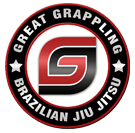Today’s post begins with a statement you definitely don’t want to hear: your success in Brazilian Jiu Jitsu is going to be directly connected to your ability to deal with loss. Sorry, it’s true. But for some individuals, the desire to win is so strong that anything besides victory puts a bad taste in their mouth, forces them into a depression, or — even worse — angers them.
Regardless of the teams and affiliations that we have in Brazilian Jiu Jitsu, grappling is an individual sport. What this means is that although we have teammates that help us learn, condition and prepare, when it comes time to compete only the individual competitor goes out onto the mat. At the end of the match there will be one winner, and one loser.
Your odds of winning are going to vary greatly based on a wide variety of factors like who your opponents are, how your game matches up against theirs, your experience in competition, who is officiating your match, and of course, pure luck. Sometimes the odds are stacked against you, and even though you perform to the top of your ability, you lose. Maybe you slip on the mat and they call it a takedown, or maybe your opponent got a first-round bye while you had a knock-down-drag-out match with a killer. Whatever the scenario, you now face a painful but undeniable truth:
You are a loser.
There are a number of ways that you can deal with this. You can stomp your feet, make a scene, yell at the referee, post on Facebook, or even (ridiculously) blame your opponent. I’ve seen all of these things and they simply don’t change the fact that you lost, and that you are a loser.
Losing, for all the emotions it brings, is part of our sport. And the sooner that you bring yourself to understand this — and accept it — the happier you will be. After you stop focusing on the emotions associated with loss, you can turn your thoughts to something more productive, like training. And training is one of the only factors you have control over that will influence your ability to win or lose a match.
The concept thus far has been fairly easy to follow, but it is time to take it one step further.
I have a pretty good guard game. A lot of people that visit my school come here specifically to ask me about half-guard and closed guard. I’ve heard all sorts of questions concerning these two positions and more importantly how or why I’m so good at them. Part of the reason I’m good at these positions is because I’ve spent a lot of time training and repping the moves, but the main reason I have a great guard is because I’m not remotely worried about having my guard passed.
As white belts we learned to have small victories. Each sweep became a mini-victory, every submission we escaped a tiny emotional win, and of course every time we kept someone from passing our guard we quietly felt good about ourselves. This “good” feeling that we have is our body rewarding us for learning by releasing dopamine into our blood stream. It’s a learning mechanism that reinforces motor movements and behaviors so that we can progress as grapplers (and humans).
When you are first learning how to grapple these types of “rewards” are very important for our development. It’s part of what drives us to keep training and continue getting better. As we build more complex games and focus on the bigger picture it’s important to reevaluate our understanding of winning and losing. We need to separate our desire to win and lose from our performance on the mat. What we need to do is realize that there is no winning or losing, only how we perform. Once you stop grading or labeling your performances as wins or losses, your whole outlook on grappling will change.
A test to see if you are physically programmed for “micro-wins” is to choose one of your hardest training partners in your next class and pull guard. Fight for position as you normally would and when that moment comes when they pass your guard, what is your thought process? What is your thought process after the match? Are you relieved they didn’t pass your guard? Are you happy that you recomposed and swept them? Maybe you’re annoyed that they passed your guard because you’re tired and now they are going to lie on you for the next two minutes and sap your energy.
All of these are emotional responses. NONE of them will help you become a better grappler.
The sooner that we come to understand these feelings and recognize them, the sooner we can reshape our thinking process. Force your thoughts back onto something that matters and try to separate yourself from the emotional aspects of our sport so that you can become more successful. Those moments of emotional thought can cost you a tenth of a second that can be the difference in you having your underhook after they pass or the ability to move your hips before your opponent settles. These are the fractions of seconds that matter and there is no time for emotion.
Now, please don’t think that I’m suggesting that winning isn’t important. Feel free to look back through this article to make sure I never said that. But what I am saying is that your focus needs to be placed on the things that actually impact your performance. At the end of the day the only thing you have direct control over is your training. Take your wins and your losses as tools for your training.
Film as many of your competition matches as possible. Review them, look at where you went wrong and correct the problems by drilling the correct responses. Use the videos to form strategies and understand pathways. Make lists of both good and bad things that you did in the match and utilize drill time accordingly. Make every victory and defeat a lesson that helps build you as a grappler.
Because when you separate your desire (emotion) to win or lose from your ability (logic) to grapple, you will find that your technique application increases greatly. Your capacity to win is directly connected to your ability to successfully apply techniques.


